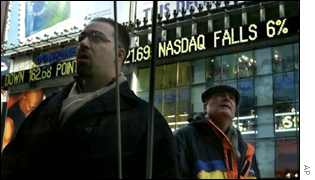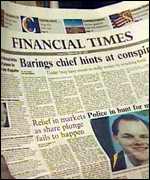| Front Page |
| World |
| UK |
| UK Politics |
| Business |
| Market Data |
| Economy |
| Companies |
| E-Commerce |
| Your Money |
| Business Basics |
| Sci/Tech |
| Health |
| Education |
| Entertainment |
| Talking Point |
| In Depth |
| AudioVideo |

By BBC News Online's Orla Ryan
People tumbled headlong into stock markets last year.
Before parting with their cash, they headed to finance news websites, where they could get the news, opinion and prices needed to inform their decisions.
But watching share prices fall is nowhere near as much fun as watching them rise. So as the dot.com bubble burst, some of these financial news sites have run into trouble.
Now that those heady days of internet growth appear to be over - what kind of future is there for finance websites?
Going, going, gone
Their growth was driven by the development of the internet, the opportunities it offered and the demand for information it created.
Potential revenue streams for these kind of sites include subscription, advertising and syndication.
While some users do subscribe and some advertisers do advertise, it is by no means clear that enough do to ensure these companies can move into profit.
 Even well-established brands have made some cutbacks
|
Ecountries.com - the website which sought to provide high-level economic analysis online - has shut its virtual doors.
Globalnetfinancial - the parent company of Ukinvest.com - cut 50 jobs in March.
Even the more established media brands, such as the Financial Times, have cut down on their online offshoots.
Some of the print advocates of the internet economy have also suffered.
The Industry Standard, the parish magazine of the electronic economy, "suspended" its European edition in April, sacking 60 workers.
In a valedictory editorial, editor-in-chief James Ledbetter wrote: "It is one of the painful ironies of business cycles that at high economic points, companies are often willing to overspend just to ensure they remain in the game."
"At shakier times, they will shy away from what they acknowledge to be good investments, just to insure against losses."
Who wants them?
There is a mixed bag of evidence as to demand for financial information from European consumers.
Forrester Research suggests that viewing stock market prices is the seventh most popular online activity across Europe.
Jupiter MMXI's consumer research shows that financial information is a minority interest in the UK.
Only 4% to 5% of consumers surveyed are actively interested in managing their money, senior analyst Nick Jones points out.
"For the vast majority of people it is a painful process that is not pleasurable," he added.
Advertisers
But while it is hard to come up with a definitive figure of interested consumers, it does seem clear that advertisers like the people who log on to financial websites.
"They were one of the first group of advertisers to take the web... [however] the overhead of building content to put those adverts next to is very expensive," Jupiter MMXI's Nick Jones said.
Finance-related websites attracted more than 11% of overall online advertising spending in December last year, according to Forrester Research's Luca Paderni. But falling share prices has seen traffic to these sites fall, he wrote in April. Instead they are turning to sites which offer a pleasant distraction, such as entertainment.
In February this year, Europe's financial news sites saw 10.2 million unique visitors compared with 9.1 million in January, according to NetValue. Advertising revenues for financial sites fell from 3.9 million euros in January to 3.1 million euros in February.
US difference
By contrast, in the US, not only do more people hold and trade shares, but there is a far wider range of financial products on offer.
The sheer variety of financial products on offer means that there was a role for sites which detail them, Rob Sterling, financial services analyst at Jupiter in the US said.
"There are 8 or 9000 mutual funds in the US, there is a real service for cataloguing and trading them," he pointed out.
These sites may find viewers in longer-term traders, who don't log on as frequently, but provide steady custom.
Unique site visitors to financial news websites in the US were slightly up in February, despite the drop in the Nasdaq, indicating a more dedicated readership.
Syndication
The sites that could do best "are the ones that provide content for banks and brokers, syndicated content and advice services, those will be the ones that make the strongest showing," Rob Sterling said. He points to some 10,000 US banks, who either have websites or will want them. "Where are they going to get the content? They are not going to get it themselves, they will get it from syndicated content providers," he said. This approach leaves news providers such as Reuters in a strong position.
This model is similar to that adopted by Onvista, the German company - already profitable in its home country - which launched in the UK in April. A spokeswoman for Onvista.de said: "We are making most of our money by licensing our content to other websites. We have about 45 licensing clients, mostly banks, stock exchanges and media companies. "
Depressingly for the journalists who have been laid off from financial websites, she says one of the secrets of their success is that they don't employ their own journalists.
She added:"One of our success factors is we don't have an editorial team...it is less expensive to buy [news] and display it."
| Search BBC News Online |
||
Advanced search options | ||
|
| |
|
| |
The BBC is not responsible for the content of external internet sites